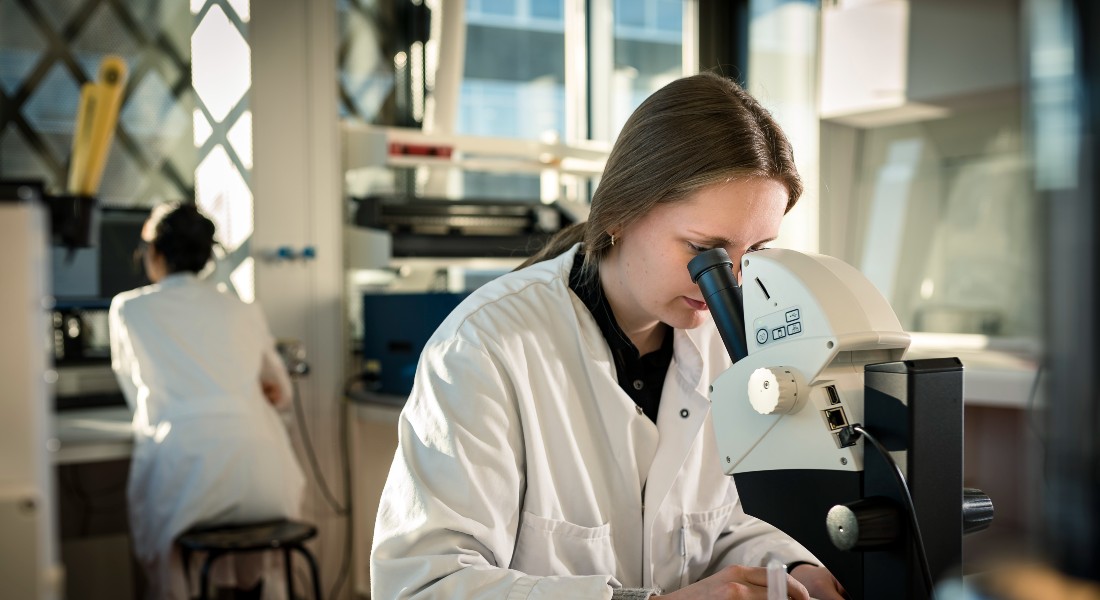Nine young SUND-researchers receive millions to ignite career
Lundbeck Foundation Postdocs research grants are aimed at young, highly qualified scientists working in the field of biomedical sciences. SUND receives nine out of total of 31 Postdoc grants for 2022.

The Lundbeck Foundation supports young aspiring scientists working in the field of biomedical sciences.
All recipients hold a PhD in their field, and they are now looking to specialise further, with a view to a long career in research. Congratulations to:
Arturo Carabias del Rey has been awarded a postdoc research grant from Lundbeck Foundation worth DKK 2,399,376.
His project seeks to develop new tools for the CRISPR gene-editing technique. Popularly called, ‘gene scissor technology’, this precision technique is used for genetic manipulation, for instance, in disease research.
Jade Degrandmaison has been awarded a postdoc research grant from Lundbeck Foundation worth DKK 2,399,915.
Her project focuses on Parkinson’s disease, investigating, among other things, cellular and physiological mechanisms behind the neurodegenerative processes that destroy dopamine-producing cells in connection with Parkinson’s. She also seeks to identify genes that can be used as diagnostic ‘tools’.
Emil Peter Thrane Hertz has been awarded a postdoc research grant from Lundbeck Foundation worth DKK 1,800,000.
His project will use an advanced version of the CRISPR gene-editing technology (‘the gene scissor) to study, among other things, disease mechanisms associated with the neurodegenerative disorder ALS.
Part of this project will be conducted in the USA at the Broad Institute, which is part of Harvard and the Massachusetts Institute of Technology (MIT).
Eleni Kafkia has been awarded a postdoc research grant from Lundbeck Foundation worth DKK 2,400,000.
Utilising a series of advanced genetic tools and analysis methods, she will study, among other things, how specific functions are ‘programmed’ and develop in the nervous system’s early stages.
Janko Kajtez has been awarded a postdoc research grant from Lundbeck Foundation worth DKK 2,397,400.
With the help of an advanced screening platform, he will study several thousand tiny molecules in search of new drug candidates for the treatment of Parkinson’s disease. The focus is on medicine to fight the breakdown of neurons in the brain caused by Parkinson’s disease.
Gunhild Tidemann Okholm has been awarded a postdoc research grant from Lundbeck Foundation worth DKK 2,231,102.
Her project will investigate the influence that type 2 diabetes and depression can have on age-related decline in cognitive function. She will examine 5,000 Danish men who underwent health checks and intelligence tests when they were summoned for military duty around the age of 20 – and who later, in their 60s, underwent the same battery of tests.
Steffen H. Raun has been awarded a postdoc research grant from Lundbeck Foundation worth DKK 2,374,021.
His project will study the loss of muscle mass and fat that 50–80 per cent of all cancer patients experience. This loss affects quality of life and can negatively impact how the patient reacts to treatment – thereby negatively impacting the survival rate.
Loss of muscle mass and fat in connection with cancer may be linked to an appetite suppressing hormone – GDF 15 – which could potentially be adjusted upwards. The project will be investigating the details of this link, which are at yet not fully understood.
Part of this project will be conducted in the USA at Stanford University in California.
Quentin Thomas has been awarded a postdoc research grant from Lundbeck Foundation worth DKK 2,388,940.
His project seeks to understand how oxidative stress affects neural connections in the brain in relation to neurodegenerative diseases like Alzheimer’s, Parkinson’s and ALS.
Ulku Uzun has been awarded a postdoc grant from Lundbeck Foundation worth DKK 2,399,995.
In her project, she will study the composition of and modifications to various types of ribosomes – the tiny ‘factories’ that manufacture the proteins inside cells.
She will examine these ‘protein factories’ in nerve cells to determine whether the placement in the nerve cell influences how the ‘factory’ functions.
